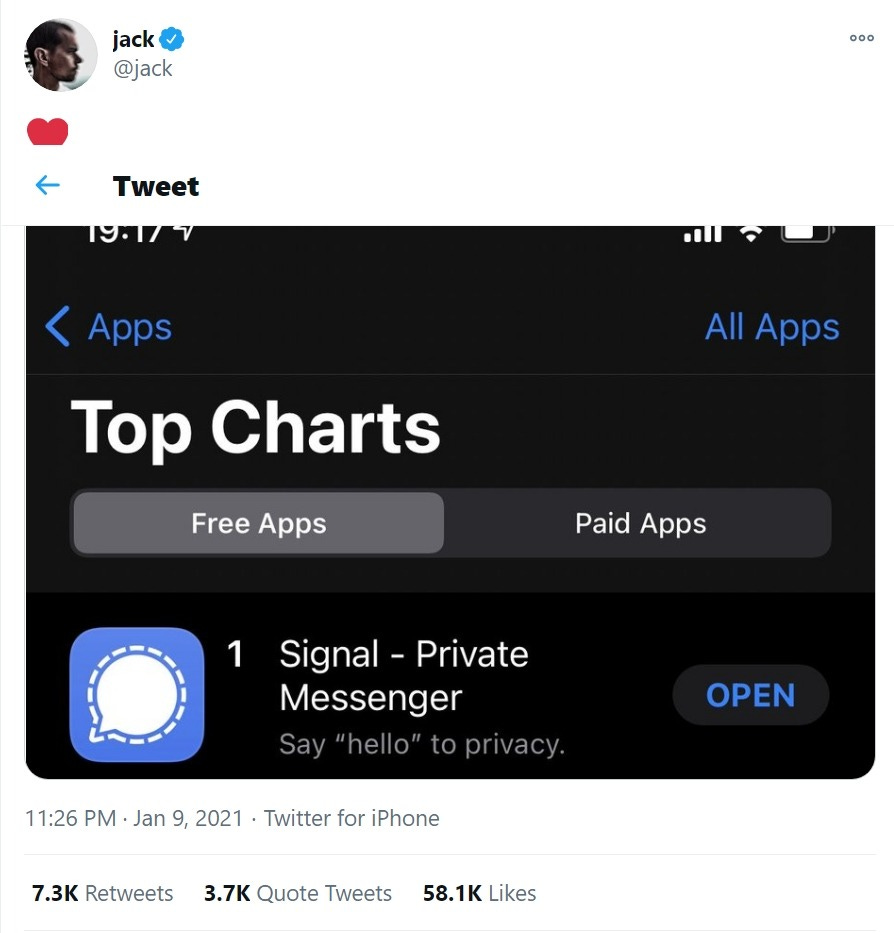Twitter Supports Dictators & the Taliban While Censoring, Retired Chicago Firefighter NOT a Rioter or in DC, Threatened Anyway, South Korea & Danger of Continual Impeachment (The Five for 1/13/21)
Hey, welcome to The Five.
BEFORE WE BEGIN, JOIN MY PRIVATE SOCIAL NETWORK
Last week, I started a virtual community for the readership of The Five on Discord, a private social network hosted on a server away from the reach of big tech.
Every day, readers of the five are discussing ideas and sharing wisdom around these topics:
Workouts and health
reading
investing
community development
self defense and survival.
Yes, it’s one more app on your phone…but after you read this newsletter I think you’ll understand why I’m building a future for this community that lives completely outside of big tech.
Download the app and join by clicking this link and meet some great people who also are trying to live in a way that makes the world a better place.
Join now (it’s free).
[one]
If you haven’t been following one of the most talked about stories of the year so far, the banning of Parler raises heavy questions about tech, freedom of speech and censorship.
The “free speech social media platform” Parler gained traction in 2020 as Facebook and Twitter banned more users—some for legitimate grievances and some without any explanation. Just today, a farmer I followed, who’s feed was completely non-partisan and non-controversial, was permanently banned from Twitter with no option for an appeal.
I had an account on Parler, but never actually followed anyone…so I can’t tell you much about it. After the Capital riot, both Apple and Google deleted the app from their stores, meaning no new users could access the social media platform from their phones. Shortly after that, Amazon Web Services completely deleted the site from the internet.
Parler is different from Facebook and Twitter in the approach to bannable content (threats of violence, etc). To ensure free speech is being upheld, human moderators review any disputed posts rather than allowing algorythms and bots to mass delete/block content and accounts. Amazon decided they weren’t doing it fast enough, and killed the whole platform over 100 pieces of controversial content.
To paint a complete picture here, it’s helpful to know that the riots were allegedly largely planned on Facebook, as well as the fact that the FBI has been watching Parler for extremist content for some time.
To compare Parler with other networks, Amazon, Google and Apple are all good with Twitter, who allowed comedican Kathy Griffin to re-post this photo of a Donald Trump lookalike’s severed head on election night, even though the same post triggered an investigation by the Secret Service in 2017.
It’s not suprising, as Twitter has been famously slow to act on certain content, like this tweet from Nation of Islam leader Louis Farrakan, comparing Jews to termites. The tweet stayed up for more than a year.
Also currently allowed on Twitter’s platform:
Zabehulah Mujahadid—spokesman for the Taliban
The Chinese Embassy—which borders on using the platform to openly brag about their genocide of Turkish Muslims.
Nicholas Maduro—dictator of Venezuala, who the UN has labled as one of the worst human rights abusers on the earth.
One thing that’s certain is that Parler was eroding Twitter’s user base…and there’s at least a circumstantial case to be made that four of the biggest tech companies in the world (Twitter, Amazon, Apple and Google) colluded to destroy a new competitor in their industry.
Parler had been the #1 app in the Apple App store, and after it was killed off Twitter founder Jack Dorsey took to his own network to brag about it.
[two]
As an update to this story, Twitter founder Jack Dorsey has said that…Twitter has too much power? I guess?
In a rant, again on his own network, Jack claims he’s funding an alternative to Twitter to be built on a decentralized network, so that nobody has as much power as he does.
Deadline reports:
“Twitter is funding a small independent team of up to five open source architects, engineers, and designers to develop an open and decentralized standard for social media. The goal is for Twitter to ultimately be a client of this standard.”
Dorsey likened the proposed new decentralized standard to Bitcoin, the digital currency which is also decentralized. Dorsey called it “a foundational internet technology that is not controlled or influenced by any single individual or entity. This is what the internet wants to be, and over time, more of it will be.”
He acknowledged that such a project “will take time to build. We are in the process of interviewing and hiring folks, looking at both starting a standard from scratch or contributing to something that already exists. No matter the ultimate direction, we will do this work completely through public transparency.”
I mean, he could just run his own company with better ethics.
This is like a domestic abuser giving $100,000 to the women’s shelter so many you won’t ask about his own wife’s black eyes and missing teeth.
[three]
If you’re looking for a reason to use your better judgement and NOT share doxxing stories on social media, here you go.
(Note: doxxing is theg practice of exposing a person’s private info, like phone number and home address)
Retired Chicago firefighter David Quintavalle is receiving death threats on his home phone…because he bears a passing resemblance to a rioter in D.C. who had a Chicago Fire Department beanie on, according to the Orland Park Patch (my local paper when I lived in the Chicago burbs, BTW).
Here’s David:
And here’s the rioter who bears a passing resemblance, and happened to be wearing a beanie of David’s former employer, Chicago Fire Department.
There’s clear evidence that David was in Chicago all day during the riot, including proof he visited Aldi and Home Depot.
David was doxxed by a Canadian woman who used Google to “identify” him. He’s regularly receiving death threats, and is currently under 24/7 police protection to ensure his safety.
[Four]
Trump’s second Impeachment passed the House yesterday but will not be tried or voted on in the Senate before the 45th President leaves office in six days.
At this point, it’s safe to say that Impeachment has lost all credibility, as incoming Republican Congresswoman Marjorie Taylor Greene is already threatening to impeach Biden AND Harris. She doesn’t start her term until next Thursday, 1/21.
To compare this current politcal climate to South Korea, we could be headed down a very dark political road. Half of all living Korean Presidents have done prison time, and the issue was brought to light again this week when the country’s Supreme Court decided to keep the last President in prison for 22 years for corruption.
The Associated Press reports:
Park, who was ousted from office and arrested in 2017, could potentially serve a combined 22 years behind bars, following a separate conviction for illegally meddling in her party’s candidate nominations ahead of parliamentary elections in 2016.
But the finalizing of her prison term also makes her eligible for a special presidential pardon, a looming possibility as the country’s deeply split electorate approaches the next presidential election in March 2022.
President Moon Jae-in, a liberal who won the presidential by-election following Park’s removal, has yet to directly address the possibility of freeing his predecessor. Moon has recently seen his approval ratings sink to new lows over economic problems, political scandals and rising coronavirus infections.
Many conservative politicians have called for Moon to release Park and another convicted former president, Lee Myung-bak, who’s serving a 17-year term over his own corruption charges. At least one prominent member of Moon’s Democratic Party, Lee Nak-yon, has endorsed the idea of pardoning the former presidents as a gesture for “national unity.”
In other words, current President Moon Jae-in has to decide if he wants to pardon Park, so that maybe the next President will pardon him.
South Korea seems to be in a cycle of perpetual witch hunts against current and former leaders, which puts a strain on the nation.
Whatever you think of Hillary and/or Trump (and/or Obama/Dubya/Clinton etc.) one has to question the valuee of dragging the public through continual impeachments and corruption trials for our highest leaders.
Maybe they all deserve prison. But the cost of enforcing that could further tear the fabric of our fraying nation.
[five]
And finally, Cryptocurrencies come one step closer to being a part of everyday life thanks to the Winkelvoss Twins (co-founders of Facebook) who are launcing a credit card that pays up to 3% cash back in cryptocurrencies.
TechCrunch reports:
Cryptocurrency exchange company Gemini is acquiring Blockrize and announcing a new product today based on Blockrize’s work. Later this year, the company is launching a credit card that works like a regular credit card — but you earn bitcoin rewards based on your purchases.
The credit card will work like any other credit card and will be available in the U.S. Customers will earn up to 3% in bitcoin rewards (again, up to 3%). You'll be able to earn other crypto assets as well. Those rewards will be deposited on your Gemini account.
Cyrptocurrencies like Bitcoin experience (often wild) fluctuations in value…but are on the rise as unstable politics, the ongoing pandemic and other factors make many aspects of life and business uncertain. Unlike money tied to a specific country…cryptocurrencies are (for the most part) immune to inflation (a government printing more money to get out of it’s own debt, which reduces the buying power of your paycheck & savings).
So, the option to get credit card rewards in an asset that could increase in value (Bitcoin) rather than decrease (the American dollar) may be appealing to those of us who love weird internet money.
Until the next one,
-sth





